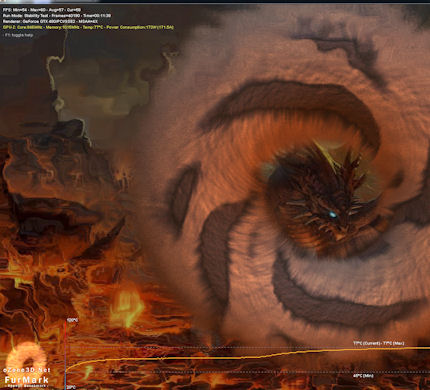HEXUS.bang4buck, bang4watt and overclocking
In a rough-and-ready assessment of the cards' bang for buck, we've aggregated the 1,920x1,080 frame-rates for five games, normalised them* and taken account of the cards' prices.
But there are more provisos than we'd care to shake a stick at. We could have chosen five different games, the cards' prices could have been derived from other sources and pricing tends to fluctuate daily.
Consequently, the table below highlight a metric that should only be used as a yardstick for evaluating comparative performance with price factored in. Other architectural benefits are not covered, obviously.
| Graphics cards | KFA2 GeForce GTX 480 1,536MB | ASUS GeForce GTX 480 1,536MB | ZOTAC GeForce GTX 470 1,280MB | ASUS GeForce GTX 465 1,024MB | ZOTAC GeForce GTX 460 SLI 1,024MB | EVGA GeForce GTX 460 SC SLI 768MB | ZOTAC GeForce GTX 460 1,024MB | EVGA GeForce GTX 460 768MB | XFX Radeon HD 5970 2,048MB | Sapphire Radeon HD 5850 XF 1,024MB | HIS Radeon HD 5870 1,024MB | Sapphire Radeon HD 5850 1,024MB | Sapphire Radeon HD 5830 1,024MB |
|---|---|---|---|---|---|---|---|---|---|---|---|---|---|
| Aggregate FPS (1,920x1,080) |
408.5 | 380.1 | 306.47 | 246.59 | 455.1 | 449.8 | 251.3 | 234.16 | 430.4 | 445.42 | 300.27 | 263.97 | 211.02 |
| Normalised* FPS (1,920x1,080) |
340.15 | 316.95 | 252.48 | 188.24 | 371.55 | 366.8 | 196.03 | 174.84 | 365.2 | 372.31 | 263.56 | 223.09 | 156.5 |
| Current pricing | £410 | £360 | £230 | £170 | £330 | £280 | £165 | £135 | £450 | £470 | £320 | £235 | £160 |
| bang4buck (1,920x1,080) |
0.830 | 0.880 | 1.098 | 1.107 | 1.126 | 1.31 | 1.188 |
1.295 | 0.812 | 0.792 | 0.824 | 0.949 | 0.978 |
| Peak power consumption | 385 | 389 | 346 | 333 | 390 | 375 | 289 | 270 | 366 | 400 | 297 | 270 | 273 |
| bang4watt** (1,920x1,080) |
0.883 | 0.815 | 0.730 | 0.565 | 0.953 | 0.978 | 0.678 | 0.648 | 0.929 | 0.998 | 0.887 | 0.826 | 0.573 |
* the normalisation refers to taking playable frame rate into account. Should a card benchmark at over 60 frames per second in any one game, the extra fps count as half. Similarly, should a card benchmark lower, say at 40fps, we deduct half the difference from its average frame rate and the desired 60fps, giving it a HEXUS.bang4buck score of 30 marks. The minimum allowable frame rate is 20fps but that scores zero.
** the HEXUS.bang4watt score is a crude measurement of how much normalised performance the GPU provides when evaluated against peak system-wide power-draw that's shown on the previous page: the former is divided by the latter. We're using the peak power-draw numbers obtained by running real-world Crysis Warhead.
Evaluation
The KFA2 Anarchy produces the highest single-GPU numbers in this selection. Taken in isolation, the benchmarks are good. But the HEXUS bang4buck is all about considering relative value, that is, how should you spend your money. It takes twin-GPU setups to beat the KFA2, and while they do produce higher numbers at a much lower price, there lie the potential foibles of having more than one GPU render a game. In fact, from a games-playing point of view, we'd always prefer a single GPU.
But we underscore this section by stating that the KFA2 card will only make financial sense if it arrives at retailers with a near-£400 price tag.Overclocking
Housed inside a Corsair 700D chassis, increasing the core voltage from 1.062V to 1.1V, running the fans at top speed (3,000rpm) and cranking up frequencies, we hit a maximum speed of 847MHz core and 4,060MHz memory. This represents the highest speed we've attained from an air-cooled GTX 480.Bear in mind that the system was pulling 530W at the wall at this point. Running the five games again at the 2,560x1,600 resolution gave an average increase of 8.6 per cent when compared with the already-pre-overclocked card, suggesting that KFA2 has some room to play with if other partners launch faster GTX 480s.










